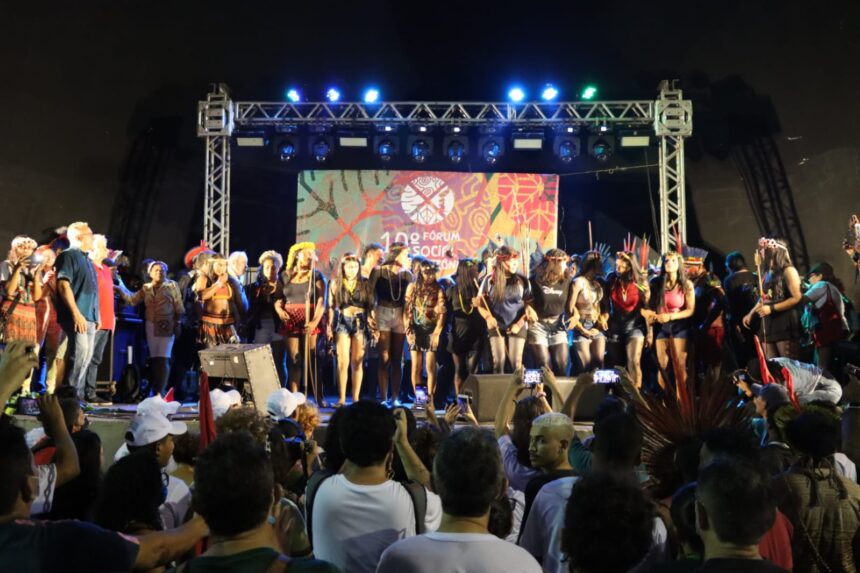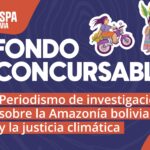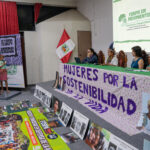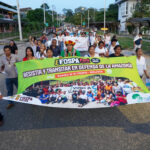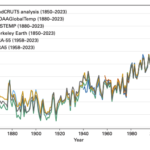X PANAMAZONIAN SOCIAL FORUM -FOSPA- July 28, 29, 30 and 31 – Belém do Pará, Brazil
FROM OUR PANAMAZONI
- Embraced in front of the Guamá River, in the great meeting where we have converged the diversities that inhabit the Panamazonia, the indigenous, black, quilombola, peasant, riverside, urban, gender and age peoples of the 9 countries of the Amazon Basin: Brazil, Bolivia, Peru, Ecuador, Colombia, Venezuela, Guyana, Suriname and French Guiana, we reaffirm the journey that 20 years ago, since the I Meeting as Panamazonic Social Forum, we started with the hope for “Another possible world”. We could not imagine that the world would be worse than the world we knew then.
- Today, the Amazon is at its worst, devastated by governments for whom nature is a commodity, and the rights of the people have no validity. Until today, no government has guaranteed the full exercise of the rights of the Amazonian peoples for the defense of Mother Nature. In this situation, it is necessary to call on the social movements and appeal to creativity, learn from mistakes and continue fighting.
- What we perceived yesterday as threats, today are realities derived from a system of multiple oppression: patriarchal, racist, capitalist and colonial, which has located the great Amazon basin as its most recent frontier of expansion, putting at risk all forms of life and those who defend them.
Under the false premise of development, extractivism, including rubber, timber, oil, agro-export, large hydroelectric dams and mega-mining, has advanced over the different Amazonian territories, and has been inserted into colonial conservation models, including proposals to commercialize elements of the biome. Under this pretext, territories are being militarized, plundering the commons to generate profits, deepening social inequity, structural and factual violence for the plurality of the population in the Panamazon, which today sees how all life is being destroyed and poisoned. - The current climate crisis and its civilizational threat, a consequence of the development model, has pushed the Amazon ecosystem to the point of no return, threatening the irreparable loss of the most important tropical forest on the planet and home to more than 50 million people along with a good part of the planetary biodiversity. If we do not stop this trend now, tomorrow will be death for the Panamazon region, vital to curb global warming and ensure life on the planet. Time is running out.
- Indigenous, peasant, black, quilombola, popular and city women, trans and lesbian women, a force of resistance in defense of life, continue to be violated by the action and omission of the States, political and religious fundamentalisms, patriarchy, racism, militarization, corruption rooted and installed in our society, capitalism that through transnational corporations and economic forces expropriate territories with impunity, the violation of bodies, trafficking, control of people and ways of life, sexual violence, femicide, violation of sexual and reproductive rights, attacks on diversity, sexual and gender dissidence.
- The entire basin is experiencing a situation of unconventional warfare, with the participation of State military forces, paramilitaries, militias and drug traffickers acting in connection with large economic interests. Added to this are unilateral coercive measures, financial and economic blockades and military threats imposed by major global powers and fundamentalist groups.
- We reiterate that, although the dangers have been accentuated, the struggles and resistances have acquired an unprecedented strength, from the experience of the spiritualities of our peoples, who must continue to grow as children of Mother Amazonia. In this sense, the peoples of the Panamazonia are organizing, coming together, fighting for their territories and cultures, to make a future possible. This is how the anti-racist, anti-patriarchal and anti-colonial struggles are advancing. Maintaining the optimism that has characterized us, but with a realism that forces us to demand what is (im)possible. That another world is possible.
WE EXPRESS OUR POLITICAL PROPOSAL - We demand a political, social and economic model that prioritizes the integrity of our common home, that recognizes and respects the territories and the full exercise of the rights of Amazonian peoples and the rights of Nature.
- Recover, value and protect the knowledge of men and women and ancestral forms of organization of our peoples for the care and management of water, the protection of their territories, which include our rivers clean and free of megaprojects. We reaffirm the support of the Pan-Amazonian Social Forum for the proposal for the Universal Declaration of the Rights of Rivers, which complements the legal advances in various countries in the recognition of the inherent rights of rivers, as part of the rights of Nature, which converge with the ancestral knowledge of the Amazonian indigenous peoples, who know that rivers are living beings, whose health and freedom are inseparably linked to that of human, biodiverse, climatic and spiritual communities, today threatened by predatory and polluting, energy, mining projects , oil and transport tankers, among others, of a suicidal nature and that must be stopped and eradicated.
- Our alternatives for a land without evil are diversified agricultural and forestry production in harmony with nature, agroforestry, agroecology, projects for local production and consumption, community management of common goods, forests and territory, the use of native seeds, community ecotourism, alternative energy projects, integrated and participatory care and management of watersheds and bioregions, and many other initiatives focused on life and not on the commodification of nature.
- We propose to articulate efforts and struggles in defense of the territories of the Panamazonia and life, as well as with other social movements in other regions of the world against the patriarchal, colonial, racist neoliberal economic model that violates all our individual and collective rights, against corruption and against political, economic, socio-cultural and religious fundamentalisms.
- We urge the governments of Pan-Amazonian countries to put into practice their speeches against the climate crisis and the rights of Mother Earth, with real measures against deforestation, degradation and increased emissions, and not with make-up of the so-called green economies. We demand that they fulfill and strengthen their international commitments.
- Promote the exercise of self-government and self-determination of indigenous peoples, blacks, quilombolas, peasants, riparians that allow the exercise of public management based on their own vision, rules and procedures; for this, it is required, among other issues, the implementation of appropriate mechanisms to new forms of planning to ensure their ways of life, respecting the worldviews. Without territorial self-management of the peoples, there is no future for the Amazon, nor for the world. We demand that States fully comply with the verdicts of the Inter-American Court of Human Rights. Furthermore, the 2015 Kalina and Lokono verdict pronounced by the OAS must be enforced by the government of Suriname. Finally, we demand the self-determination of French- occupied Guyana. Our Amazon Basin will not be complete until we achieve its decolonization.
- We reject the extractivist public policies of governments that threaten life and nature. We demand compliance with ILO agreement 169 and that the right to free, prior and informed consultation and consent be signed, ratified, respected and implemented, which includes the right to veto due to cultural conscientious objection within the framework of the self-determination of peoples and we demand to maintain hydrocarbons in the subsoil and an Amazon free of mining.
- Demand from governments the full ownership and legal guarantee of the territories of peoples and communities, including the subsoil, so that they have permanent protection against the extraction of minerals and hydrocarbons, so that they do not violate our mother earth, to take care of the spirits of the forest, and to ensure the Good Living of human beings and all forms of life.
- To condemn and reject the implementation of coercive measures; such as any form of political, economic, financial and diplomatic blockade that weighs on any country in our Amazon Basin, as they are criminal political actions that affect our peoples.
- To assume the radical defense of the rights of the peoples of Panamazonia to education, communication and health from a popular, intercultural, communitarian, critical and decolonial perspective.
- The women of the Panamazonia are committed to the reinvention and collective construction of the democracy we want. We call on all peoples and organizations of the Amazon to include in their agendas actions that correct the inequalities and power relations that persist and affect our lives, bodies and territories. This articulation should be directed towards advocacy in international spaces that can make recommendations to the States regarding the urgency of the inclusion of concrete actions that respond to the transformation of the violence that affects Amazonian and Andean women.
- We strongly endorse the letters of the Pre-FOSPAs held in each country and the conclusions of the Houses of Knowledge and Senses (House of Mother Earth, House of Women’s Resistance, House of the Commons of Nature, House of Indigenous Peoples and Rights and the House of Territories and Self-Governance).
- We ratify the importance of action initiatives as instruments of mobilization to achieve the objectives of the FOSPA process. It is only possible to generate processes of transformation if our organizations of the Panamazonia adhere and articulate ourselves in these actions.
- We support the International Tribunal for the Rights of Nature that arrived in a caravan to Belém after traveling through the Xingu and Carajás territories. We endorse its approach: that the Amazon is a living and threatened entity, subject of rights, to which the companies, in complicity with the states, have declared war, and the indigenous communities, settlements, camps, local communities, traditional, peasants, quilombolas, riverside communities, indigenous peoples, rural and urban, are those who are in the front line of this confrontation, and their rights must be guaranteed. At the same time, it is important to highlight the multiple initiatives of integral restoration, extractivist moratorium and ecological transition promoted by the communities.
- We are Nature and we are more than 37 countries that recognize at various levels the rights of Nature, including the rights of the Amazon. In Brazil, 4 municipalities have approved this recognition and 4 more states are debating it, including Belém, host of the Tenth Panamazonian Social Forum (FOSPA). In this sense, we celebrate the creation and launching of the Global Parliamentary Front for the Rights of Nature, composed of indigenous and non-indigenous authorities from all over the world, which seeks to extend this paradigm shift more quickly and directly with public policies that recognize nature as a subject of rights.
AND WE PROPOSE THE FOLLOWING ACTIONS - Declare a State of Climate Emergency in the Panamazon region and its permanent compliance to allow its active restoration and the protection of its biodiversity, in coordination with the Amazonian peoples and to advance towards a new paradigm of relationship with nature.
Progress towards a paradigm shift will be our best legacy. This will demand the transfer of significant resources for the restoration and care of the Basin and the transformation of the international trade of commodities of the regional economy, giving priority to the production and commercialization of goods that are climatically compatible with the Amazon ecosystem, restricting the export of meat, soy, wood, minerals, hydrocarbons and derivatives to the markets of Europe, Asia, North America and others. - To support the verdict of the III Ethical Tribunal in defense of the bodies and territories of Amazonian and Andean women, which will continue to meet and investigate the cases presented there. We will continue to strengthen this scenario of visibility and international advocacy that has allowed us to focus on the multiple impacts of the system of discrimination in the lives, bodies and territories of women, being violence, in its various manifestations, which emerges as a result of the current patriarchal and colonial and racist capitalist power.
- To promote education, research and communication as pillars of the processes of transformation in the territories of the Panamazonia, promoting their own scenarios that qualify the struggles and actions of incidence with the States, through the elaboration of mappings and systematizations of transforming, popular, intercultural and community experiences with Panamazonian emphasis, fostering inter-learning, the promotion of studies and participatory and transforming research-action.
- To guarantee the common objective of zero real deforestation and the promotion of the treaty of non- proliferation of fossil fuels, which will allow us to leave oil under the ground and advance towards a popular energy transition.
- Promote the recognition of the inherent rights of the Rivers, as part of the rights of Mother Nature, to eradicate their depredations and pollution and flow free, clean, in spiritual and biodiverse harmony with the peoples.
- Strengthen the initiative of action in defense of the bodies and territories of Amazonian and Andean women, as the backbone of our collective bets that respond to the offensive of patriarchy, political and religious fundamentalisms, capitalism and racism, which most strongly affects indigenous, black and peasant women who inhabit the Amazon Basin.
From there, we will continue to make these realities visible and to advocate through campaigns and mobilizations in defense of the lives of Amazonian and Andean women and the rejection of all forms of discrimination and violence against their bodies and territories. - Support the realization of an Amazonian Meeting of autonomies and self-government; that supports the formation of indigenous, quilombola and peasant guards and other traditional communities for the self-protection of the territories, making their effective sustainability viable.
- Promote the articulation to achieve permanent, local and global campaigns:
– That helps stop the export of products that promote pollution and deforestation of the Amazon.
– To confront hunger, promoting food security in the Panamazon region.
– To watch over the life and protection of nature defenders, denouncing and confronting, in all the countries of the Panamazon region, their persecution, criminalization, prosecution, threats, disappearances and assassinations by those who are the new traffickers and predators of the forests, mafias and hired killers that affect the life of the peoples and other forms of life. Solidarity among our peoples must be effective and effective with them; our advocacy must be sustained so that the states guarantee their lives from the ratification and fulfillment of the Escazú Agreement, condemning the perpetrators and honoring the martyrs.
– To watch over the self-determination of Guyana colonized by France. - Promote the trade of goods that are produced in compatible systems and in harmony with theAmazon. Our alternatives include ecological agroforestry, peasant family farming and community management of the forest, for the replacement of the economy of destruction of the Amazon by an economy of the forests.
- Promote Earth Assemblies to confront corporate capture and the failure of UN conferences on climate, biodiversity and food systems, which do not provide an effective response to the climate and ecological crisis.
- To create new forms of regional integration, based on the consolidation of a bloc of Amazonian countries that will allow progress towards post-extractivism in the Amazon.
- To demand the commitment of the States in the construction of regional mechanisms that guarantee respect for the free transit of the inhabitants of the Amazon Basin in all the countries that compose it.
- We support the resolution of the judges of the International Tribunal on the Rights of Nature that proposed to hold a Tribunal on the Rights of Nature in Canada, where the capital of the Belo Sun project that is to be developed in the Xingu Basin comes from, in order to make visible and denounce at the source, how its resources are being used for the destruction of the Amazon.
- We call upon the diversity of organizations working for the defense and integral care of the Amazon to continue strengthening their transforming capacities in processes of articulation around the FOSPA Action Initiatives.
FOSPA will continue weaving alliances with different social movements in the world with the purpose of expanding actions to overcome the humanitarian, environmental and climate crisis, and to influence international governmental bodies for the adoption of policies that are consistent with this global purpose.
July 31, 2022, in Belém do Pará, Brazil,
capital of resistance, trench of the peoples.
“Weaving hope in the Panamazon zone”

